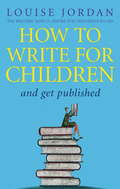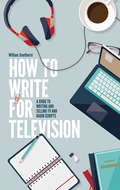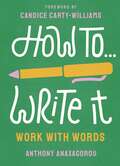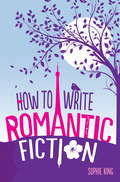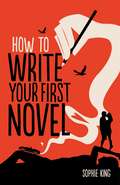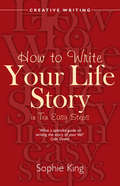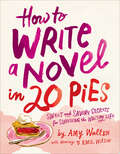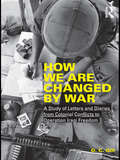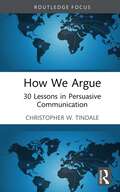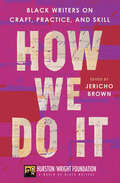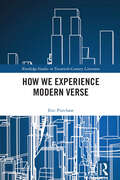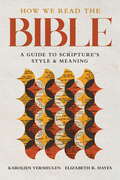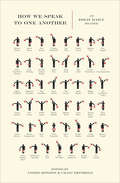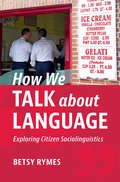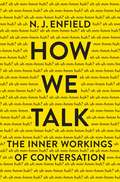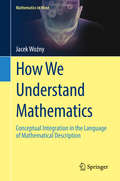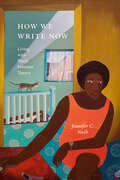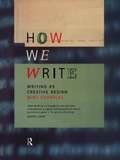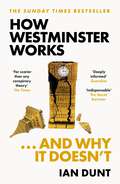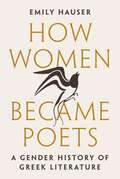- Table View
- List View
How To Write For Children And Get Published
by Louise JordanHuge numbers of people want to write for children, but it is notoriously difficult to find a publisher in this increasingly comeptitive area. This inspiring and practical guide from acknowledged expert on children's publishing Louise Jordan, will show you how to make your work stand out from the crowd and appeal to commissioning editors, and, of course, your intended audience.
How To Write For Children And Get Published
by Louise JordanHuge numbers of people want to write for children, but it is notoriously difficult to find a publisher in this increasingly comeptitive area. This inspiring and practical guide from acknowledged expert on children's publishing Louise Jordan, will show you how to make your work stand out from the crowd and appeal to commissioning editors, and, of course, your intended audience.
How To Write For Television 7th Edition: A guide to writing and selling TV and radio scripts
by William SmethurstThis book provides professional tips and techniques for those wishing to break into writing for TV whether it's a soap, series drama, or situation comedy. It covers all aspects of script writing such as structure, plotting, characterization and dialogue and is packed with advice on presenting and selling scripts. It also includes a chapter specifically on writing for radio.
How To Write For Television 7th Edition: A guide to writing and selling TV and radio scripts
by William SmethurstThis book provides professional tips and techniques for those wishing to break into writing for TV whether it's a soap, series drama, or situation comedy. It covers all aspects of script writing such as structure, plotting, characterization and dialogue and is packed with advice on presenting and selling scripts. It also includes a chapter specifically on writing for radio.
How To Write It: Work With Words (Merky How To #1)
by Anthony Anaxagorou_________________________How to Write It: Tell Your StoryThis book is a masterclass in the craft of writing and poetry from one of Britain's most celebrated poets and educators, T.S. Eliot Prize nominee Anthony Anaxagorou.Taking readers on a personal journey through his early life and school years, through to his relationship with literature, education poetry and writing, this book is filled with tips, anecdotes and publishing advice for anyone interested in getting their work seen. From Anthony's first slam win to the evolving British poetry scene, this book will provoke readers into thinking about their writing more carefully - be it a poem, short story or novel - and help them finally get their book out into the world.This book is essential reading for taking your work to the next level, and is introduced with an inspirational foreword by Sunday Times bestselling author, Candice Carty-Williams. _________________________'This brilliant little book [...] a guide to writing practical and theoretical' Radio 4, 'Start The Week'_________________________Designed to inspire and encourage readers to unlock their potential and provoke change, the How To series offers a new model in publishing, helping to break down knowledge barriers and uplift the next generation. Creatively presented and packed with clear, step-by-step, practical advice, this series is essential reading for anyone seeking guidance to thrive in the modern world. Curate your bookshelf with these collectable titles.
How To Write Romantic Fiction
by Sophie KingRomantic fiction is one of the most competitive areas for a writer to crack. Whether you?re a beginner or an already-published writer, you?ll find something new here.This book will help you to write novels that both sizzle and sell. You'll learn how to dream up heroes and heroines who breathe (heavily) from the page, plan plots to keep the reader up all night, find a happy ending, which is both surprising and believable - and most importantly get published!
How To Write Your First Novel
by Sophie KingThis revised edition takes aspiring novelists through the steps of writing a novel, from finding that initial idea, to keeping the plot going and crafting the perfect ending. With helpful exercises in each chapter you will learn how to:- Develop a brilliant idea for your first novel - Create characters that will make your novel come alive - Plot your novel so that your readers simply have to turn the page - Unravel the mysteries of viewpoint - Create realistic dialogue and settings so your readers feel they are there - Find your own voice. - Most importantly, the book includes tips and advice on how to get published. This new edition also includes a ten step guide to revision so that you can polish your novel to be the best it can be.
How To Write Your First Novel
by Sophie KingLet best-selling novelist Sophie King guide you through the whole process of writing your first novel and getting it published.This revised edition takes aspiring novelists through the steps of writing a novel, from finding that initial idea, to keeping the plot going and crafting the perfect ending. With helpful exercises in each chapter you will learn how to:- Develop a brilliant idea for your first novel - Create characters that will make your novel come alive - Plot your novel so that your readers simply have to turn the page - Unravel the mysteries of viewpoint - Create realistic dialogue and settings so your readers feel they are there - Find your own voice. - Most importantly, the book includes tips and advice on how to get published. This new edition also includes a ten step guide to revision so that you can polish your novel to be the best it can be.
How To Write Your Life Story in Ten Easy Steps: 'what Splendid Guide To Writing The Story Of Your Life!'
by Sophie KingWriting your life story is one of the greatest gifts you can give your family. In writing it you will find yourself drawing even closer to your children and grandchildren. You will also find it an exciting and fascinating process, one that helps you to make sense of your own life. Writing your own life story is also a very good way for creative writers to find inspiration and get started in the habit of writing. This step-by-step guide will steer you through different ways of telling your life story, in ten easy steps: * HOW TO BEGIN * USING THE POWER OF MEMORY * HOW TO START YOUR RESEARCH * DIFFERENT WAYS OF STRUCTURING YOUR LIFE STORY * HOWTO MAKE YOUR LIFE STORY STAND OUT WITH PICTURES, COLOURS AND SMELLS, ETC * HOW TO PROVIDE A CONTEMPORARY FEEL TO YOUR LIFE STORY * BRINGING THE REST OF THE WORLD INTO YOUR STORY * HOWTO END YOUR LIFE STORY AND MAKE SURE THAT IT DOESN T HURT ANYONE (INCLUDING YOURSELF) * HOW TO PRESENT YOUR LIFE STORY AND GET IT PUBLISHED *STORIES TO INSPIRE YOU / Nowadays, you can publish your life story should you want to do so. For a small amount of money, you can get a few bound copies or you can publish it free on the net. Don’t miss this wonderful opportunity to write an heirloom which will last for ever.
How To Write Your Life Story in Ten Easy Steps: 'what Splendid Guide To Writing The Story Of Your Life!'
by Sophie KingWriting your life story is one of the greatest gifts you can give your family. In writing it you will find yourself drawing even closer to your children and grandchildren. You will also find it an exciting and fascinating process, one that helps you to make sense of your own life. Writing your own life story is also a very good way for creative writers to find inspiration and get started in the habit of writing. This step-by-step guide will steer you through different ways of telling your life story, in ten easy steps: * HOW TO BEGIN * USING THE POWER OF MEMORY * HOW TO START YOUR RESEARCH * DIFFERENT WAYS OF STRUCTURING YOUR LIFE STORY * HOWTO MAKE YOUR LIFE STORY STAND OUT WITH PICTURES, COLOURS AND SMELLS, ETC * HOW TO PROVIDE A CONTEMPORARY FEEL TO YOUR LIFE STORY * BRINGING THE REST OF THE WORLD INTO YOUR STORY * HOWTO END YOUR LIFE STORY AND MAKE SURE THAT IT DOESN T HURT ANYONE (INCLUDING YOURSELF) * HOW TO PRESENT YOUR LIFE STORY AND GET IT PUBLISHED *STORIES TO INSPIRE YOU / Nowadays, you can publish your life story should you want to do so. For a small amount of money, you can get a few bound copies or you can publish it free on the net. Don’t miss this wonderful opportunity to write an heirloom which will last for ever.
How To Write a Novel in 20 Pies: Sweet and Savory Secrets for Surviving the Writing Life
by Amy WallenAs a novelist, memoirist, and associate director of the New York State Summer Writers Institute, Amy Wallen has a few things to say about the writing world, many of them irreverent and snarky. From her perspective as a teacher, mentor, and published author, her belief is that the way to survive the hard knocks of writing a book and trying to get published is to bust a gut working, laughing, and eating pie.With chapters including "Oh Agent, Where Art Thou?", "Revising, Rewriting, and Reimagining," and "The Joy of Rejection," Wallen balances out the challenging stages of the writing process with both sweet and savory goodness, featuring recipes for chocolate pecan pie, salmon and portobello pie, and the recipe for the best cherry pie ever. Throughout the book, Wallen demystifies the vagaries of the publishing business, providing delicious recipes that will keep your belly full even when you're staring at an empty page. Her writing advice is neatly paired with the brilliant illustrations of Emil Wilson, who shares her sharp wit, sardonic look at the demands of the writing life, and her mad love of pie. Combined, the stories, lessons, images, and recipes will provide encouragement and camaraderie for the novel-writing journey, from putting pen to page, to finding an agent, to celebrating publication—all with a piece of pie.
How We Are Changed by War: A Study of Letters and Diaries from Colonial Conflicts to Operation Iraqi Freedom
by D.C. GillThe prolonged conflict in Iraq has shown us war’s transformative effect. Civilians rivet themselves to events happening halfway around the world, while young soldiers return home from battlefields, coping with the memories of those events. How We Are Changed by War examines our sense of ourselves through the medium of diaries and wartime correspondence, beginning with the colonists of the early seventeenth century, and ending with the diaries and letters from Iraqi war vets. The book tracks the effects of war in private writings regardless of the narrator’s historical era allowing the writers to ‘speak’ to each other across time to reveal a profound commonality of cultural experience. Finally, interpreting the narratives by how the writers conveyed the content adds a richer layer of meaning through the lenses of psychology and literary criticism, providing a model for any society to examine itself through the medium of its members’ informal writings.
How We Argue: 30 Lessons in Persuasive Communication
by Christopher TindaleThis accessible book provides a practical discussion of the main elements of argumentation as illustrated by 30 public arguments from a recent year on a wide variety of social, cultural, and scientific topics. Arguing is an important form of communication in any society and a principal way in which ideas are exposed, discussed, and modified. The real-life examples examined in this book reflect the different considerations that go into composing arguments and the range of strategies that can be chosen as vehicles for our positions. They demonstrate the roles that emotion can play along with other modes of conveying evidence, from the use of images to the use of gestures. They show the power of threats, comparisons, and consequences. What emerges is an instructive discussion that illustrates the way we argue and that shows argument, invention, and evaluation in action. This book is a stimulating read for anyone interested in argument and public discourse and can be used as a supplemental text for courses in argumentation, persuasive communication, critical thinking, composition, and informal logic.
How We Do It: Black Writers on Craft, Practice, and Skill
by Jericho Brown Darlene TaylorMore than 30 acclaimed writers—including diverse voices such as Nikki Giovanni, David Omotosho Black, Natasha Trethewey, Barry Jenkins, Jacqueline Woodson, Tayari Jones, and Angela Flournoy—reflect on their experience and expertise in this unique book on the craft of writing that focuses on the Black creative spirit.How We Do It is an anthology curated by Black writers for the creation and proliferation of Black thought. While a creator’s ethnicity does not solely define them, it is inherently part of who they are and how they interpret the world.For centuries, Black creators have utilized oral and written storytelling traditions in crafting their art. But how does one begin the process of constructing a poem or story or character? How do Black writers, when faced with questions of “authenticity,” dive deep into the essence of their lives and work to find the inherent truth? How We Do It addresses these profound questions. Not a traditional “how to” writing handbook, it seeks to guide rather than dictate and to validate the complexity and range of styles—and even how one thinks about craft itself.An outstanding list of contributors offer their insights on a range of important topics. Pulitzer Prize winner Jericho Brown explores the lives personified in poetry, while Pulitzer Prize winner Natasha Trethewey explores decolonizing enduring metaphors. National Book Award finalist Angela Flournoy illuminates the pain of grief in all forms and how it can be revealed in the act of creation, and iconoclast Nikki Giovanni offers an elegiac declaration on language.New and previously published essays and interviews provide encouragement, examples, and templates, and offer lessons on everything from poetic form and plotting a story to the lessons inherent in the act of writing, trial & error, and finding inspiration in the works of others, including those of Toni Morrison, Shakespeare, and Edward P. Jones. A handbook and a reference tool, How We Do It is a thoughtful and welcome tool that offers direction to help Black artists establish their own creative practice while celebrating and widening the scope of the Black writer’s role in art, history, and culture.Contributors include Daniel Omotosho Black, Jericho Brown, Breena Clark, Rita Dove, Camille T. Dungy, W. Ralph Eubanks, Curdella Forbes, Angela Flournoy, Ernest Gaines, Nikki Giovanni, Marita Golden, Ravi Howard, Terrance Hayes, Mitchell S. Jackson, Barry Jenkins, Charles Johnson, Tayari Jones, Jamaica Kincaid, Tony Medina, E. Ethelbert Miller, Elizabeth Nunez, Carl Phillips, Jewell Parker Rhodes, Rion Amilcar Scott, Evie Shockley, Natasha Trethewey, Frank X Walker, Afaa M. Weaver, Crystal Wilkinson, Jacqueline Woodson, Tiphanie Yanique.
How We Experience Modern Verse (Routledge Studies in Twentieth-Century Literature)
by Eric PurchasePoetry moves us. Sometimes a poem changes our life. Then we analyze it as a cultural artifact with no special connection to us. An extensive critical apparatus enables us to develop sophisticated interpretations, but we dismiss as "idiosyncratic" even life-changing experiences of poetry. We need an apparatus to unfold our experience of reading poems into a more effective relationship with the world. Modern poets in particular wrote prophetic verse for this purpose. Archetypal psychology and phenomenology describe the soul that modern poetry moves in us. Three prosodic mechanisms activate the psyche. The polyphony of accentual and quantitative versification creates depth to lure the soul. Aural images reshape the reader’s stream of consciousness. Readers follow the movement of blocks of verse across the expanse of the page with what Maurice Merleau-Ponty terms the phenomenal body. These mechanisms reach us at the collective level of consciousness and generate the power we need to solve big, collective challenges, such as race, climate change, and inequality.
How We Read the Bible: A Guide to Scripture's Style and Meaning
by Elizabeth R. Hayes Karolien VermeulenThe Bible is interpreted in a variety of ways and through a myriad of lenses. But how we interpret Scripture depends first of all on how we read it. This handbook focuses on the process of reading itself, taking a cognitive-stylistic approach grounded in recent research on language and the mind. Through accessible explanations of twelve key stylistic elements, How We Read the Bible provides all who study Scripture with the tools to understand what happens when we read and draw meaning from biblical texts. Rather than problematizing the divide between authors from the ancient world and a modern-day audience, Karolien Vermeulen and Elizabeth Hayes bridge the gap by exploring the interaction between the cues of the text and the context of the reader. With numerous examples from the Old and New Testaments and helpful suggestions for further study, How We Read the Bible can be used within any framework of biblical study—historical, theological, literary, and others—as a pathway to meeting Scripture on its own terms.
How We Speak to One Another (The Golden Greek)
by Ander Monson Craig ReinboldThe essay is rhizomatic: it builds off and shoots out conversations between us every time we read, reread, or write. When we speak back to others we amplify ourselves and get a foothold in an ongoing conversation. How We Speak to One Another collects those conversations, giving context to a genre, deepening the flexibility and vitality of its many forms.Ander Monson is the author, most recently, of Letter to a Future Lover: Marginalia, Errata, Secrets, Inscriptions, and Other Ephemera Found in Libraries (Graywolf Press). He is also the author of Vanishing Point, a finalist for the National Book Critics Circle Award, and Neck Deep and Other Predicaments.Craig Reinbold's writing has appeared in journals and magazines including the Gettysburg Review, Iowa Review, New England Review, Guernica, Gulf Coast, and Brevity. He was the managing editor of Essay Daily from 2013 to 2016.Contributors include: Ander Monson, Marcia Aldrich, Kristen Radtke, Robin Hemley, Robert Atwan, Matt Dube, Aisha Sabatini Sloan, T. Clutch Fleischmann, Rigoberto González, Kati Standefer, Julie Lauterbach-Colby, César Diaz, Emily Deprang, Lucas Mann, Danica Novgorodoff, Bonnie J. Rough, Peter Grandbois, Albert Goldbarth, Alison Hawthorne Deming, Steven Church, Bethany Maile, David Legault, Joni Tevis, John D'Agata, Meehan Crist,Thomas Mira Y Lopez, Danielle Deulen, John T. Price, Maya L. Kapoor, Chelsea Biondolillo, Megan Kimble, Brian Doyle, Nicole Walkder, Paul Lisicky, Brian Oliu, Pam Houston, Dave Mondy, Phillip Lopate, Amy Benson, Patrick Madden, Elena Passarello, Erin Zwiener, Patricia Vigderman, and Ryan Van Meter.
How We Talk about Language: Exploring Citizen Sociolinguistics
by Betsy RymesThe most important challenges humans face - identity, life, death, war, peace, the fate of our planet - are manifested and debated through language. This book provides the intellectual and practical tools we need to analyse how people talk about language, how we can participate in those conversations, and what we can learn from them about both language and our society. Along the way, we learn that knowledge about language and its connection to social life is not primarily produced and spread by linguists or sociolinguists, or even language teachers, but through everyday conversations, on-line arguments, creative insults, music, art, memes, twitter-storms - any place language grabs people's attention and foments more talk. An essential new aid to the study of the relationship between language, culture and society, this book provides a vision for language inquiry by turning our gaze to everyday forms of language expertise.
How We Talk: The Inner Workings of Conversation
by N. J. EnfieldAn expert guide to how conversation works, from how we know when to speak to why huh is a universal wordWe all had teachers who scolded us over the use of um, uh-huh, oh, like, and mm-hmm. But as linguist N. J. Enfield reveals in How We Talk, these "bad words" are fundamental to language.Whether we are speaking with the clerk at the store, our boss, or our spouse, language is dependent on things as commonplace as a rising tone of voice, an apparently meaningless word, or a glance--signals so small that we hardly pay them any conscious attention. Nevertheless, they are the essence of how we speak. From the traffic signals of speech to the importance of um, How We Talk revolutionizes our understanding of conversation. In the process, Enfield reveals what makes language universally--and uniquely--human.
How We Understand Mathematics: Conceptual Integration In The Language Of Mathematical Description (Mathematics in Mind)
by Jacek WoźnyThis volume examines mathematics as a product of the human mind and analyzes the language of "pure mathematics" from various advanced-level sources. Through analysis of the foundational texts of mathematics, it is demonstrated that math is a complex literary creation, containing objects, actors, actions, projection, prediction, planning, explanation, evaluation, roles, image schemas, metonymy, conceptual blending, and, of course, (natural) language. The book follows the narrative of mathematics in a typical order of presentation for a standard university-level algebra course, beginning with analysis of set theory and mappings and continuing along a path of increasing complexity. At each stage, primary concepts, axioms, definitions, and proofs will be examined in an effort to unfold the tell-tale traces of the basic human cognitive patterns of story and conceptual blending. This book will be of interest to mathematicians, teachers of mathematics, cognitive scientists, cognitive linguists, and anyone interested in the engaging question of how mathematics works and why it works so well.
How We Write Now: Living with Black Feminist Theory (Black Feminism on the Edge)
by Jennifer C. NashIn How We Write Now Jennifer C. Nash examines how Black feminists use beautiful writing to allow writers and readers to stay close to the field’s central object and preoccupation: loss. She demonstrates how contemporary Black feminist writers and theorists such as Jesmyn Ward, Elizabeth Alexander, Christina Sharpe, and Natasha Trethewey mobilize their prose to ask readers to feel, undo, and reassemble themselves. These intimate invitations are more than a set of tools for decoding the social world; Black feminist prose becomes a mode of living and feeling, dreaming and being, and a distinctly affective project that treats loss as not only paradigmatic of Black life but also an aesthetic question. Through her own beautiful writing, Nash shows how Black feminism offers itself as a companion to readers to chart their own lives with and in loss, from devastating personal losses to organizing around the movement for Black lives. Charting her own losses, Nash reminds us that even as Black feminist writers get as close to loss as possible, it remains a slippery object that troubles memory and eludes capture.
How We Write: Writing as Creative Design
by Mike SharplesHow We Write is an accessible guide to the entire writing process, from forming ideas to formatting text. Combining new explanations of creativity with insights into writing as design, it offers a full account of the mental, physical and social aspects of writing. How We Write explores: how children learn to write the importance of reflective thinking processes of planning, composing and revising visual design of text cultural influences on writing global hypertext and the future of collaborative and on-line writing. By referring to a wealth of examples from writers such as Umberto Eco, Terry Pratchett and Ian Fleming, How We Write ultimately teaches us how to control and extend our own writing abilities. How We Write will be of value to students and teachers of language and psychology, professional and aspiring writers, and anyone interested in this familiar yet complex activity.
How Westminster Works . . . and Why It Doesn't: The instant Sunday Times bestseller from the ultimate political insider
by Ian DuntWhy do some prime ministers manage to get things done, while others miserably fail? What is a 'special adviser' and how did they take over British political life? And why is the House of Lords more functional than most people think?Most of us have a sense that our political system doesn't seem to work, but struggle to articulate exactly why. And for good reason: our political and financial institutions are cloaked in secrecy, archaic terminology, ancient custom and impenetrable jargon. Now, expert political journalist Ian Dunt is lifting the lid on British politics to expose every aspect of the setup in a way that can be understood and challenged. From Downing Street to Whitehall, the Commons to the Lords, this book is an indispensable guide to our political system - and how we might begin to fix it.
How Westminster Works . . . and Why It Doesn't: The instant Sunday Times bestseller from the ultimate political insider
by Ian DuntWhy do some prime ministers manage to get things done, while others miserably fail? What is a 'special adviser' and how did they take over British political life? And why is the House of Lords more functional than most people think?Most of us have a sense that our political system doesn't seem to work, but struggle to articulate exactly why. And for good reason: our political and financial institutions are cloaked in secrecy, archaic terminology, ancient custom and impenetrable jargon. Now, expert political journalist Ian Dunt is lifting the lid on British politics to expose every aspect of the setup in a way that can be understood and challenged. From Downing Street to Whitehall, the Commons to the Lords, this book is an indispensable guide to our political system - and how we might begin to fix it.
How Women Became Poets: A Gender History of Greek Literature
by Emily HauserHow the idea of the author was born in the battleground of genderWhen Sappho sang her songs, the only word that existed to describe a poet was a male one—aoidos, or “singer-man.” The most famous woman poet of ancient Greece, whose craft was one of words, had no words with which to talk about who she was and what she did. In How Women Became Poets, Emily Hauser rewrites the story of Greek literature as one of gender, arguing that the ways the Greeks talked about their identity as poets constructed, played with, and broke down gender expectations that literature was for men alone. Bringing together recent studies in ancient authorship, gender, and performativity, Hauser offers a new history of classical literature that redefines the canon as a constant struggle to be heard through, and sometimes despite, gender.Women, as Virginia Woolf recognized, need rooms of their own in order to write. So, too, have women writers through history needed a name to describe what it is they do. Hauser traces the invention of that name in ancient Greece, exploring the archaeology of the gendering of the poet. She follows ancient Greek poets, philosophers, and historians as they developed and debated the vocabulary for authorship on the battleground of gender—building up and reinforcing the word for male poet, then in response creating a language with which to describe women who write. Crucially, Hauser reinserts women into the traditionally all-male canon of Greek literature, arguing for the centrality of their role in shaping ideas around authorship and literary production.
